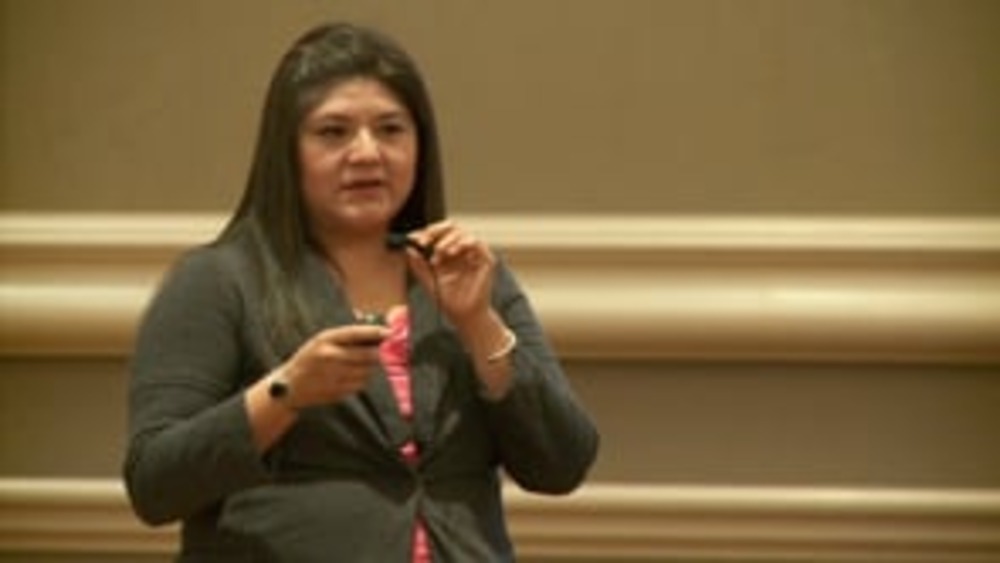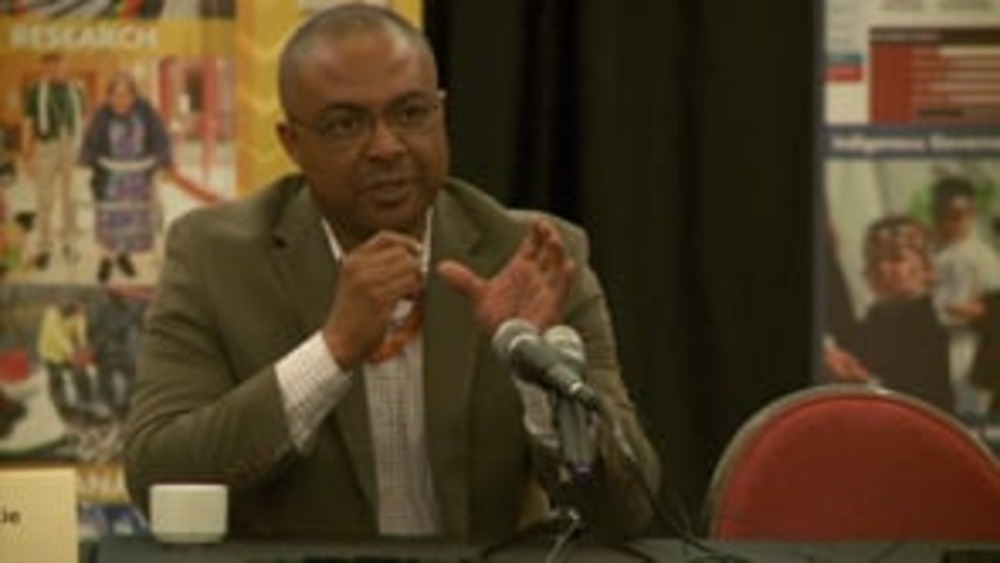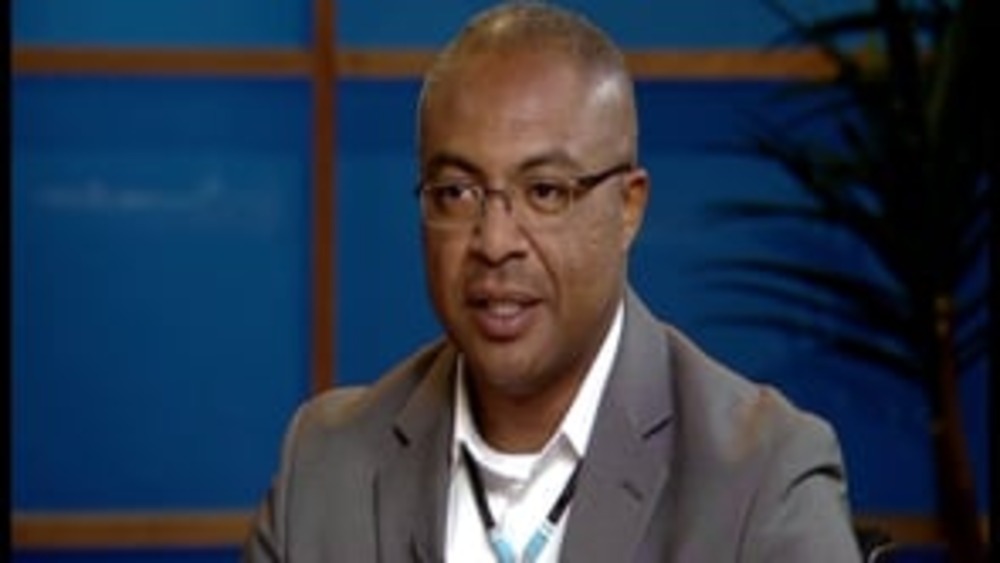Pueblo of Laguna Governor Richard Luarkie provides a brief overview of how Laguna citizens gradually and systematically ascend up the leadership ranks within the Pueblo through their adherence to and practice of Pueblo core values.
Additional Information
Luarkie, Richard. "How Do We Choose Our Leaders and Maintain Quality Leadership?: The Pueblo of Laguna." Tribal Constitutions seminar. Native Nations Institute for Leadership, Management and Policy, University of Arizona. Tucson, Arizona. April 3, 2014. Presentation.
Transcript
"Good morning everyone. Good to see all of you here. Thank you to the University of Arizona for inviting me down to have some time with you today and Shannon [Douma] did a great presentation this morning on focusing on the development of youth. I'm going to talk a little bit more on the...what she's building for on the tribal leadership side and those elements.
And many of you are currently serving in different roles or have served in roles or you support even those that served in roles, but I guess the perspective I want to take with you is pretty basic. We're taught in all our different communities about who we are and where we come from and all those critical pieces of education. In Laguna, we're taught about our creation story and how we came to be as Native people.
And [Pueblo language], our mother, the Creator, created everything. As Shannon mentioned, we all have roles. So she created first the moon, the sun, the stars, the earth, [Pueblo language], the sage singers. And she gave them [what their] roles and responsibilities would be and what their responsibility was to be; talked to them day in and day out. The sun as we all know comes up every morning from the east, goes across the [Pueblo language], protects us, gives us light, gives us guidance, [Pueblo language]. The moon, the sun, they come out or the moon, the stars then it's their turn. They take turns watching over us. So we're never in the dark because there's always some light on us. That's their role.
Then the spiritual beings were created and their role, as we all know, we start most every day, in your own particular teachings, but we're taught you carry your pouch, you carry your corn meal. We start every day with prayer, ask for that guidance, extend your appreciation for the day, for the life that you've been given. [Pueblo language], it's only borrowed. It's [Pueblo language], the breath we breathe, the heart we have; it's only borrowed. We thank for that every day that we have an opportunity again for a new day. We thank the spirits for that. We ask for her strength for guidance to live a good life.
Then the last creation was us, [Pueblo language], the people. But we were bestowed responsibility as well. [Pueblo language] she bestowed us [Pueblo language], love one another. [Pueblo language], respect one another, [Pueblo language], be careful with one another's heart, don't hurt each other, take care of yourself. [Pueblo language], as we grow, have the ability to learn. [Pueblo language], to be obedient. [Pueblo language], to be disciplined in your thought process. Those are the responsibilities we were given.
So I start in that manner because when you look at leadership, when you look at governance, it's not about your degree, it's not about how good you can write policy or how good you interpret the law. It's how do you take care of the people right? When I talk to young kids, I tell them your most important education is what she talked about; what does grandma teach you, what grandma teaches you, what mom and dad teach you, what the community teaches you. That's your most important education. And I'm not saying a degree is not important because it is, but it's a tool. You can have masters and have a law degree, a PhD, a medical degree, but if you're a jerk it doesn't matter. You need to be a good person. You need to be a good person.
And so those are really important things I think that we need to keep in mind when we think about the earth because when you come into leadership, in Laguna as an example, we're taught, and Shannon and Casey [Douma] can verify results with me. When we're preparing for leadership, we start our leadership in the community. You're responsible for, 'Go help your grandpa, go help your grandma, go cut weeds, go help with everything.' That's where it starts. Not to punish you, not to penalize you, but to teach you responsibility, and paying the price up front first before you go play. Nothing wrong with that.
When we looked at our offices that we had in the Pueblo, we have positions that...what we call the town crier, that's kind of your entry-level position. It's the guy that goes around and he lets the community know that there's going to be a village meeting, there's going to be ditch work, there's going to be grave digging or whatever, keeps the buildings clean and that kind of stuff. Then we have the next officer, which is our mayordomos or ditch bosses, those that are responsible for the land, the irrigation, the land issues, those kind of things. Then you have the council member. The council member obviously serves in our tribal council. Then you have a staff officer. We have six villages and so each village has a staff officer and that staff officer is kind of like the mayor of the village so he's the head of that village. And then we have the governor, secretary, treasurer, interpreter, those positions, the at-large positions.
So in our way, you should normally start as the town crier because you get to know who's in the community, you get to know your community. Then once you finish that maybe you can go to the middle, then you start being a little bit more involved with the direct family issues and your community issues, land issues. Then you can go to a council member once you've completed here, then you can be a council member because now let's assume you've learned your community just a little bit more, you've understood the foundation. Then you can go to the staff position, kind of the head of the village. And then if the people think of you otherwise, then maybe they might consider you for the governor position or the other positions. And that's an important process because it teaches you...it teaches you patience, it teaches you how to learn about your community, but also about yourself.
The other piece of our process is that we don't have a process or a system that allows for declaration of candidacy nor can you campaign. As a matter of fact, if you do those you're disqualified. It's up to the people to decide who is ready for these positions. Then they put your name in for consideration, the people will do the nominating as to who's going to go on the ballot. But even at that point, that teaching, again that starts to what Shannon was talking about, that starts in the home. That teaching also teaches you about [Pueblo language], permission.
When I got nominated for the governor position, I could have just said, 'Alright, I got nominated.' That's not what you're supposed to do. I have to go home now and tell my wife and get her permission and say, 'They nominated us,' not just me. Do I have your permission to accept because it's not just me?' And if she said no, then that's as far as we get. We go to the village and say, 'Thank you for your consideration.' But in this case she allowed it. So you need permission. That's what we're taught in our community, the males, what we get from the female, so we can't just do as we please or we shouldn't anyway. Unfortunately there's a lot of inconsistency with that, but that's our teaching. The clans and all those things we get from our mother. But what that teaches you as well is that humility and serving and being there to carry out the responsibility of the office and the policies and the rules and everything.
So as I stand here as governor with you, it's interesting because at the beginning of the term when the people that's holding office, they give you the canes. We've got canes that represent the symbol of our authority. We have a cane that goes back to the 1600s when the Spanish recognized the Pueblo's right to self-govern. We have a Mexican cane from the 1800s. We have from Abraham Lincoln, Abraham Lincoln gave us pueblos in the 1800s, 1863, 1864. So the governor carries the Abraham Lincoln cane. The First Lieutenant carries the Spanish and the Second Lieutenant carries the Mexican. So we still have those and every term or administration, we hand those over to the next official. And when they hand those over, they give us the offices then of course we have to speak to the people and let them know our elections and so on and so forth.
There was one year when we went through that process and one of our officials, they gave us the canes and he got up to make his comments and he said, 'You know, I'm willing to serve and willing to take care of our responsibilities, now you've given me the power to make decisions, I have the power to do this, I have the power to do that.' And he finished his comments. So it got to my turn. I got up to speak, made my comments, but I also touched on what he said about power and I believe this to this day. As the governor, I have no power. All I have is responsibility and authority, that's it. And it's defined for me in the constitution, the policies and the bylaws that we have ordinances. I have no power. The minute I believe I have power, I've lost touch because it then becomes about me and there are people that are very adamant about [Pueblo language], it's not about you. [Pueblo language], literally means 'don't puff your chest, don't show off, don't brag. It's not about you. The people are behind you.' The power resides [Pueblo language] our people [Pueblo language] with our Creator. That's the only place that has power. I have none.
So in that regard, going back to the creation story, the start of it, the little tidbit, Twitter of our creation story. If you don't have that piece, it's very easy to get caught up in all this other stuff. It's very important you start your day in prayer, however it is you pray. Keep your faith. Don't be jumping from this way to this way to that way. Keep your faith, whatever it is. And I think as we go forward in the development of leadership those are things that where at the point of time you need to be aligned with one another.
As parents now, a lot of times...I remember growing up in the Pueblo there and when my...grandpa and grandma raised me. If grandmother had something on the table, if I didn't like it, guess what, I didn't eat. But now sometimes I see parents going and trying to figure out, 'What do I feed my kid who doesn't like what I serve?' We need to get away from that, we need to be able to get our kids to be responsible, to be faithful. You want them all to grow up and be appreciative of what's provided. Whatever little bit, maybe not lobster, but if it's fried potatoes a couple nights in a row, to me that's a feast. Those are feelings that you need to be reminded because when you come into leadership role, those are the things that will help guide and help you make sound decisions, the simplicity.
And as I close here, whether you're a leader for this tribe or that tribe or whatever tribe, whether you're working in a particular program or whatever, know that the people have value; everybody has value. We're in a situation in our communities that I'm seeing now as we go across the country and go to different meetings and what not where we see, well, maybe a person committed murder, maybe a person did this, did that, and we're saying, 'Get rid of that person.' It's a difficult conversation that we're having to have now because in Native communities, we don't have the right to pull a weed and just throw it. As a leader, I don't have the choice to pick and choose whoever. I have to accept and love all of you regardless of what you've done. Granted, there's laws, there's passion, there's safety, responsibility -- all these things we need to balance. But going back to the creation story, our Creator didn't say, 'Leaders, you only need them and them. You only love them and them.' That's not our teaching, but we're embracing that. Then we're willing to fight with our own. Everybody has value.
So I want to encourage you that we find that way...we find a way to recognize that value in one another. The elders, I know a lot of times...like I said, my grandparents raised me. My grandmother was born in 1903. When I came around she was already in her 60s, when I was born. She died in the '90s, she was 88. But, you know, grandparents are so very, very special and those of you that are grandparents know that you're loved, know that you're loved. You are teachers, you are caretakers, you are guides, you are protection and you are angels. You never know if you're going to...these are all elements I intentionally bounced because in our Native communities we don't have a written document that states, 'Here's how you need to live.' All these things contribute. Back to my point: everyone has value. Grandparents, I love you because my grandparents raised me. I have a special tie to them as grandparents.
So with that, I hope that I've been able to contribute here. Just on the comical side, a couple years ago, my daughter, she was about eight years old and she said, 'Dad, help me with this science problem.' 'Sure.' And it was on sugars and all those kinds of things and when I started college I so I was like a biology major and chemistry minor so I learned about carbons and sugars and all that kind of stuff. So I took off and was [sharing] my knowledge and my wisdom. So I went into talking about the structure of sugars and all that kind of stuff and she was sitting there really listening intensely. So after I finished she goes, 'Wow, Dad.' And I thought she was going to say, 'Wow, you're the smartest guy in the world.' And she goes, 'Wow, Dad, you have a lot of useless information.' Thank you very much."



